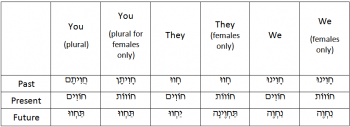How to Use the Hebrew Verb to Experience Posted by Ayana on Mar 18, 2019 in Uncategorized
The International Day of Happiness (יוֺם הָאֹושֶׁר הַבֵּינְלְאוּמִּי) is celebrated worldwide every March 20th.
According to the international 2018 Happiness Report Israelis are pretty joyful: the report ranked Israel as the 11th happiest country in the world. And yet Israeli magazines and websites are filled with lists of tips about how to be happier. (For advanced Hebrew reading check out this article, or this article). One of my favorite tips is to invest in experiences, not in products. Shopping is fun, but memories last longer than objects. Reviving our everyday with new experiences is a sure prescription to happiness.
The Hebrew word for experience is חֲוָויָה (ha-va-ya). The noun חֲוָיָה is feminine, as indicated by the ending with the letter ה. The Hebrew adjectives describing the word חֲוָיָה are feminine as well. For example:
Good experience = חֲוָויָה טוֺבָה
Bad experience = חֲוָויָה רָעָה
Interesting experience = חֲוָויָה מְעַנְיֶינֶת
New experience = חֲוָויָה חֲדָשָׁה
Its plural form is חֲוָויוֺת (ha-va-yot), in which only the third syllable changes its pronunciation from ‛ya’ to ‛yot’. In Hebrew, adjectives are conjugated according to the noun they describe. Whether or not the noun is single or plural affects the condition of the adjective as well. The plural adjectives for חֲוָויוֺת should be in their feminine plural form too:
Good experiences = חֲוָויוֺת טוֺבוֺת
Bad experiences = חֲוָויוֺת רָעוֺת
Interesting experiences = חֲוָויוֺת מְעַנְיְינוֺת
New experiences = חֲוָויוֺת חֲדָשׁוֺת
The infinitive verb of the noun חֲוָויָה is לַחְווֹת (lah-vot). For example:
לַחְווֹת חֲוָויָה חוּץ גּוּפׅית זֶה נָדִיר.
To have an out-of-body experience is rare.
לַחְווֹת אֶת הַחֲוָויָה הַזּוֺ כְּיֶלֶד וּכְבּוֺגֵר זֶה לֺא אוֺתוֺ דָּבָר.
To have this experience as a child is not the same as for an adult.
אֲנׅי רוֺצֶה לַחְווֹת אׅיתָּךְ אֶת הַחַיּׅים.
I want to experience life with you.
The way to revive our daily routine with חֲוָויוֺת חֲדָשׁוֺת (new experiences), is to try new things – לְנַסּוֺת דְּבָרׅים חֲדָשׁׅים. Collecting experiences doesn’t necessarily mean you have to climb Mt. Everest or circle the world in a hot-air balloon. Small, simple changes ensure חֲוָויוֺת חֲדָשׁוֺת as well. Wear a different outfit than usual, try a new restaurant, walk a different way home, buy a new rug for your room – try anything that will spice up your week. For example:
הַדָּבָר הַחָדָשׁ שֶׁאֲנׅי הֶחְלַטְתּׅי לְנַסּוֺת הוּא בּׅישׁוּל. קָנׅיתׅי סֵפֶר בּׅישׁוּל וְנׅיסּׅיתׅי אֶת כָּל הַמַּתְכּוֺנׅים בַּסֵּפֶר. כָּל שָׁבוּעַ נׅיסּׅיתׅי מַתְכּוֹן חָדָשׁ. זֶה הָיָה כֵּיף וְטָעִים.
The new thing I decided to try is cooking. I bought a cooking book and tried all the recipes in the book. I’ve tried a new recipe every week. It was fun and tasty.
New experiences will not only make you happy, but will also benefit your relationships with others:
חֲוָויוֺת מְשׁוּתָּפוֺת חׅיּוּנׅיּוֺת לְכָל מַעֲרֶכֶת יַחָסׅים. תִּקְשֹׁורֶת טוֺבָה הׅיא הַבָּסׅיס, אֲבָל חֲוָויָה מְשׁוּתֶּפֶת מְקָרֶבֶת בֵּין אֲנָשׁׅים. לָכֵן תָּמִיד מַמְלׅיצׅים לְזוּג שֶׁרַק הׅכּׅיר לָצֵאת לַחְווֹת יַחַד כַּמָּה שֶׁיוֺתֵר: מְסׅיבּוֺת, טׅיוּלׅים, סַדְנָאוֺת, וְכַדּוֺמֶה.
Shared experiences are essential to any relationship. Good communication is fundamental, but a shared experience brings people together. Therefore, it is always recommended that couples who have just met should go out and experience as much as possible together: parties, trips, workshops, and so on.
The root of the verb לַחְווֹת is ח-ו-ה, and it belongs to binyan pa’al. It’s conjugated as follows:


Related post:
Hebrew Verbs in Action: Binyan pa’al
Keep Calm and Learn Hebrew!

Build vocabulary, practice pronunciation, and more with Transparent Language Online. Available anytime, anywhere, on any device.





Comments:
Elaine:
Thx can I get back posts?